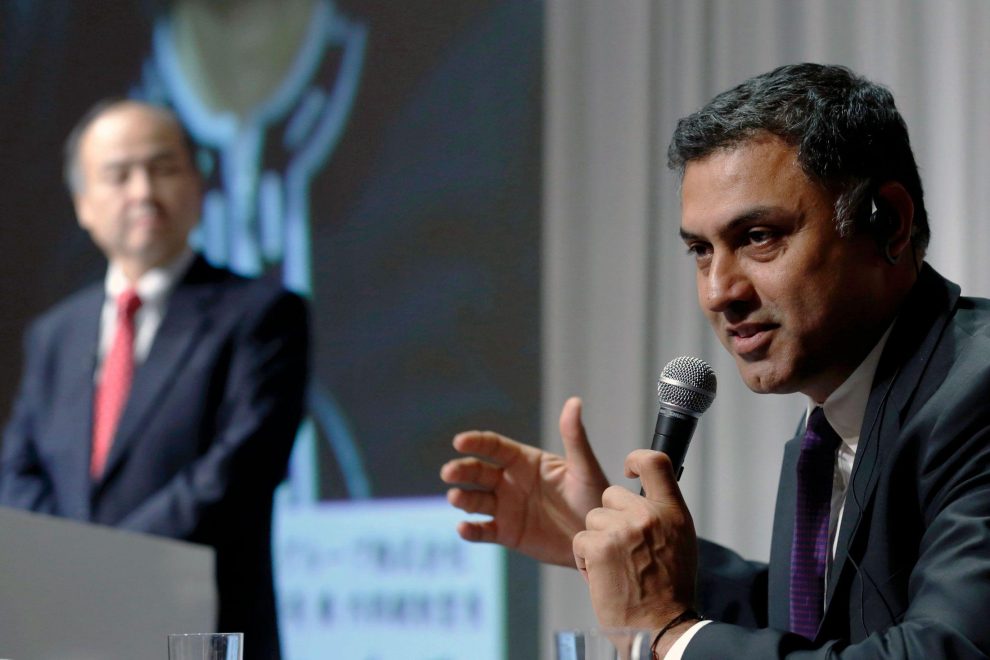
(Bloomberg) — In early March, before the coronavirus pandemic triggered a global economic lockdown, SoftBank Group Corp. founder Masayoshi Son paid tribute to Rajeev Misra, the man who runs his $100 billion technology investment fund. Wearing a $70 Uniqlo down jacket, the Japanese billionaire put his arm around Misra’s shoulders at a town hall meeting in San Carlos, California. He said he would never forget the help Misra provided when he was at Deutsche Bank AG more than a decade earlier and spoke of the trust and respect they had developed since, according to a summary shared internally. “We are family,” Son said.
But behind the smiles and talk of kinship, another story is unfolding, one about the perplexing relationship at the top of SoftBank. The Vision Fund this week reported a loss for the latest fiscal year of $17.7 billion as it wrote down the value of portfolio companies including WeWork and Uber Technologies Inc. That triggered the biggest loss in SoftBank’s 39-year history. Its shares have been hammered as investors fret that the virus will batter the company’s holdings even more, and Son has said he will sell $42 billion in assets.
Misra is at the heart of the problem in ways that go beyond how the fund’s companies are performing, people familiar with the matter say. He has come under fire for alleged efforts to tarnish internal rivals, including a previously undisclosed clash with SoftBank Chief Operating Officer Marcelo Claure. The company has acknowledged that it’s conducting an internal review. At the same time, Elliott Management Corp., the activist investment fund that built up an almost $3 billion stake in the company, has asked SoftBank to name three independent directors and create a new board committee to improve the Vision Fund’s investment process, according to correspondence reviewed by Bloomberg News.
“Misra and Masa go back a long way, but gratitude should only last so long,” said Justin Tang, head of Asian research at United First Partners in Singapore. “If Misra is not the problem, he’s at least a big part of it.”
The corporate intrigue involving Claure began in 2018, when the Bolivian entrepreneur was under consideration to join the Vision Fund’s board and investment committee, according to six people with first-hand knowledge of the matter and a review of emails and documents. The fund — run by Misra as an affiliate of the Japanese company — hired a Swiss firm called Heptagone to conduct a background check on Claure’s possible ties to money laundering and drug cartels, said the people, who asked for anonymity because they feared retaliation. The report cleared him, but its focus opened a rift between the two men that kept Claure off the fund’s board and solidified Misra’s control, the people said.
A Vision Fund spokesman said one of the fund’s limited partners, not Misra, requested the background check and Misra wasn’t involved in determining its focus. SoftBank has been told the same thing and doesn’t have evidence otherwise, people familiar with the matter say. But current and former executives across the SoftBank empire remain convinced that Misra played a role since the report was commissioned by his team and follows a pattern of similar accusations about undermining internal rivals.
In March, days after the Wall Street Journal reported that Misra had allegedly orchestrated a campaign to sabotage two former SoftBank executives beginning in 2015, Son ducked questions about the story from investors at a meeting at the Lotte New York Palace hotel, according to two people who were present. One of them, a SoftBank shareholder, told Bloomberg News afterward that the company needs a Vision Fund leader more focused on tight operations than turf battles.
Son has remained steadfast in his support. “Rajeev has been instrumental in the company’s growth and success,” Son said in a statement to Bloomberg. “He’s also been a very trusted senior executive and friend, and will continue to have my full support and confidence.” The Vision Fund spokesman denied that Misra was involved in any campaigns to undermine company executives. “The claims underpinning this story are untrue, and have been fully denied,” he said.
But some SoftBank insiders are wondering how Misra has managed to survive. It may be, they said, that Son needs his financial expertise to navigate the next few months of asset sales, share buybacks and loan repayments as the coronavirus weakens portfolio companies, hurting SoftBank’s ability to borrow. Misra helped Son finance difficult deals before joining the company in 2014 and played a crucial role in raising capital for the Vision Fund. He has also established his own power base at the fund’s London headquarters, surrounded by a coterie of former Deutsche Bank colleagues.
Still, there are long-term risks for Son in tolerating what many see as a divisive culture and chaotic infighting that have plagued the Vision Fund since its inception. “Misra personifies what Vision Fund is about — a bunch of dealmakers obsessed with leverage who have no business running a venture capital fund,” said Amir Anvarzadeh, a market strategist at Asymmetric Advisors in Singapore, who has been covering the company since it went public in 1994. “But it would be naïve to put all of their problems at Misra’s feet. Son has the ultimate word.”
Son and Misra share a bond as outsiders who left their native lands to study abroad and ended up finding wealth and prestige. Son, 62, went to the University of California, Berkeley and launched businesses in the U.S. before founding SoftBank in Japan in 1981. Misra, 58 and born in India, earned degrees from the University of Pennsylvania and the Massachusetts Institute of Technology before embarking on a career in banking at Merrill Lynch.
But while Son never worked for anyone else, Misra always operated within large organizations, navigating their power structures. He moved to Deutsche Bank in 1997, where he eventually became global head of credit trading, turning it into one of the biggest traders of credit-default swaps — instruments at the heart of the 2008 financial crisis. One of his traders, Greg Lippmann, featured in Michael Lewis’s The Big Short, bet on a crash in the U.S. housing market, even as Deutsche Bank was a leading player in creating and selling mortgage-backed securities to investors.
With slicked-back hair and a thicket of woven bracelets around his wrist, Misra speaks with an intimacy that suggests he’s confiding in a listener as he races from one subject to the next with a burning urgency. He wears his eccentricities proudly: He often padded around the office in stockinged feet, incessantly smoking, vaping or chewing nicotine gum.
Misra joined SoftBank after stints at UBS Group AG and Fortress Investment Group. He started as head of strategic finance, reporting directly to Son, but his connections to the boss preceded his appointment. In 2006, Deutsche Bank helped SoftBank finance the acquisition of the Japanese wireless operations of Vodafone Group Plc, one of the most consequential deals of Son’s career. The $15 billion purchase was the largest leveraged buyout ever in Asia at the time and faced skepticism because Vodafone had struggled against the country’s top wireless players. Son succeeded in turning the business into a viable competitor, in part by persuading Steve Jobs to give him exclusive rights to the iPhone in Japan, and completing SoftBank’s transformation from software distributor to telecom conglomerate.
Misra proved his worth at SoftBank as well. Son had acquired the troubled No. 3 wireless operator in the U.S., Sprint Corp., but the turnaround had proven far more difficult than the one at Vodafone. Misra put together a novel loan package secured by Sprint’s wireless licenses that helped it avoid bankruptcy.
From the start, Misra clashed with Nikesh Arora, a hotshot former Google executive Son recruited in 2014 to oversee SoftBank’s startup investing, according to people with direct knowledge of their relationship. Arora would openly question Misra’s judgment, even on financial issues, leaving him fuming, the people said.
In early 2015, Misra set out to undermine Arora and one of his allies at SoftBank, Alok Sama, the Wall Street Journal reported in February. The newspaper said Misra worked through intermediaries to plant negative stories about the executives, concocted a shareholder campaign against them and attempted unsuccessfully to lure Arora into a sexual tryst. “These are old allegations which contain a series of falsehoods that have been consistently denied,” a spokesman for Misra told Bloomberg News, adding that Misra thinks highly of Arora and that the two men worked together productively on many deals. “Mr. Misra did not orchestrate a campaign against his former colleagues.” A spokesman for the Wall Street Journal said the paper stands by its reporting.
Arora was cleared of wrongdoing by SoftBank, but he left in 2016 and is now chief executive officer of Palo Alto Networks Inc. Sama, who had been in charge of SoftBank’s investments and inked many of its early startup deals, seemed a logical candidate to play a leading role at the Vision Fund. But some of the limited partners expressed reservations about him, people familiar with the matter said. Arora didn’t respond to requests for comment, and an attorney for Sama declined to comment.
Meanwhile, Misra solidified his ties to Son. He spent time in Tokyo in early 2017 as Son worked on the acquisition of Fortress. He also used his former Deutsche Bank connections to help close a deal for Saudi Arabia’s Public Investment Fund to become the Vision Fund’s cornerstone investor, chipping in $45 billion, almost half of the capital. That May, Misra was named head of the Vision Fund.
The clash with Claure began after Sama was sidelined, according to SoftBank executives familiar with the matter. Son hit it off with Claure in 2013, when SoftBank took a majority stake in Brightstar, a Miami-based mobile phone distributor he founded that became one of Latin America’s fastest-growing startups. The 6-foot-6 executive quickly demonstrated how SoftBank could save millions on its purchases, winning respect from his new boss. A year later, Son tapped him to replace Sprint’s CEO. Claure made enough progress fixing the wireless operator that Son rewarded him with a seat on SoftBank’s board in 2017 and named him chief operating officer the following year.
Then, Son gave Claure a new challenge: building teams in government affairs, legal services and operations to support the company’s expanding portfolio. Part of the mission was to assemble and lead a task force that would help startups fine-tune their strategies to improve execution and speed their path to profitability. The mandate would place him at the center of the action as SoftBank transformed itself into a technology investment conglomerate. It also apparently put Claure on a collision course with Misra.
The first hint that this might not be a typical corporate rivalry came months before the Heptagone investigation, according to a person close to Claure. In the summer of 2018, Stephen Bye, a former Sprint executive, reached out to Claure with unsettling news. Bye, Sprint’s chief technology officer until 2015, was approached by a private investigator trying to dig up dirt on his former boss, the person said. Bye declined to talk to the investigator and immediately called Claure.
Claure, 49, was used to people poking into his past because he was often approached about joining corporate boards. But he had also heard speculation about Misra’s role in the campaigns against Arora and Sama, and he expressed concern that he was next, the person said. The Vision Fund spokesman said neither Misra nor anyone else from the fund was involved in the approach to Claure’s former employee. Bye declined to comment.
In October 2018, after the murder of Washington Post columnist Jamal Khashoggi at the hands of Saudi agents, Son and Misra traveled to Riyadh to meet with officials of the sovereign wealth fund, their biggest investor. They made the trip during the Saudi fund’s annual investment conference, even as other global executives canceled their travel plans. While the two men didn’t attend the conference, Son met with the head of the Public Investment Fund, Yasir Al-Rumayyan, and laid out the new role he envisioned for Claure. He would join the Vision Fund board and its investment committee, and manage the group of operations specialists when it was embedded within the fund, according to a proposal reviewed by Bloomberg News. The changes, if implemented, would give Claure broad authority at the fund.
Later that year the Vision Fund commissioned the Heptagone report. What made it different from routine due diligence, according to the people directly involved, was that the sleuths were asked to answer three specific questions: Was Claure or any company under his control ever involved in money laundering, tax evasion or fraud? Was he ever in a relationship with individuals charged with or convicted of money laundering, drug trafficking or other crimes? Had he been convicted of a crime in the U.S. or elsewhere?
Claure’s company, Brightstar, generated enormous amounts of cash selling used phones in Latin America in the 1990s, exactly the kind of business that could be used for money laundering, Heptagone’s report said. But the report found no evidence Brightstar or Claure were involved in such activities, people who saw it said.
Heptagone went on to say that Claure had a long-standing friendship with Carlos Becerra, a San Diego businessman whose name had appeared in U.S. Drug Enforcement Agency reports for possible involvement in cocaine distribution and money laundering. After Becerra sold a unit of his company to Brightstar, in 2007, the two men remained friendly. A photo on Becerra’s Instagram account from June 2015 showed him posing on a boat dock with Claure.
Becerra, who hadn’t been charged with a drug-related crime, told Bloomberg News that his relationship with Claure was cordial, not close. He denied any involvement in money laundering or drug dealing and said he has held a California liquor license since 2001, which requires a background check and isn’t available to anyone with a criminal record.
The closest Claure came to a crime, the Heptagone report found, was his involvement in a Miami bar fight in the 1990s in which no one was hurt and he wasn’t charged. Heptagone co-founder and managing partner Alexis Pfefferlé said he couldn’t confirm or deny his firm’s involvement in any report but added that Heptagone “has always been able to fully complete its assignments.”
The Vision Fund spokesman said the fund often runs background checks on employees, so it wasn’t abnormal to conduct one on Claure, given his potential involvement in operations. The only thing atypical, he said, was that it came at the request of a limited partner.
While the Heptagone report cleared Claure, its underlying premise appeared to be that a Latin American entrepreneur must have built his business through unsavory means, according to the people who reviewed the document. Claure was furious. He went to Son, outraged at what he saw as an attempt to damage his reputation, the people said.
SoftBank took over the due diligence from the Vision Fund and gave the job to Kroll, a more established security firm, the people said. Kroll, which declined to comment, found no problems in Claure’s past. But suspicious that Misra was behind the campaign, Claure told Son he wanted no formal part of the Vision Fund, the people said. Son ultimately decided to keep the two out of each other’s way.
In February 2019, about 40 employees Claure had hired were shifted over to work for Misra. Claure, who had moved his wife and four youngest daughters to Tokyo less than two months earlier, headed back to Miami. He has since helped close Sprint’s merger with T-Mobile US Inc. and is leading the effort to turn around WeWork. He also oversees a Latin American investment fund for SoftBank and co-owns a Major League Soccer team, Inter Miami, with former British star David Beckham.
SoftBank denied that Claure and Misra clashed over the operations group and said both men agreed that folding it into the Vision Fund was in the best interests of the business. “While we have had our occasional differences,” Claure said in a statement, “I have a close and collaborative relationship with Rajeev, including my involvement with many of the Vision Fund’s largest portfolio companies.”
The relationships Misra forged at Deutsche Bank continue to underpin his power and influence. Colin Fan, a former co-head of the investment bank, moved to SoftBank in 2017, joining more than half a dozen former bankers and traders from the German lender. But arguably the most important connection forged at Deutsche Bank is Misra’s relationship with London-based merchant bank Centricus, founded by three former Misra colleagues: Michele Faissola, Dalinc Ariburnu and Nizar Al-Bassam.
The firm, originally called FAB Partners for the principals’ last names, began working with SoftBank in 2016, when Misra asked it to help find financing for the Vision Fund. Centricus advised on the creation and structure of the fund, suggested employees and helped cement the investment by the Saudi sovereign wealth fund — a deal hashed out in October of that year when Mohammed bin Salman, then the country’s deputy crown prince, met with Son in Tokyo.
For its work, Centricus negotiated a payment of more than $100 million, people familiar with the arrangement said. And the fees kept coming. Centricus advised SoftBank on its $3.3 billion deal for Fortress and teamed up with Son on a failed bid to start a 24-team soccer tournament with FIFA. The firm also was brought in to help raise capital for a second Vision Fund, Bloomberg reported in mid-2019.
Some SoftBank and Vision Fund executives have questioned the amount paid to Centricus, the people with knowledge of the arrangement said. Although fees for helping companies raise capital are often about 1%, making the sum paid to Centricus a good deal for SoftBank, executives critical of Misra’s leadership were piqued that the recipients were former Deutsche Bank colleagues, the people said. Centricus and SoftBank both declined to comment about fees or any other aspect of their relationship.
Faissola left the firm after his connections with the Qatari government created tension with the Saudis. But Centricus hired another former Deutsche Bank colleague of Misra’s as a consultant: London-based hedge fund manager Bertrand Des Pallieres, a senior trader at the bank from 2005 to 2007 who reported directly to Misra.
Des Pallieres was under consideration for a job at the Vision Fund in 2018, the people said, but that all changed after the Wall Street Journal reported that Misra had recruited Italian businessman Alessandro Benedetti to undermine Arora and Sama. Benedetti, who denied through a spokesman that he had anything to do with those efforts, was a business associate of Des Pallieres. A year later, Des Pallieres became a Centricus consultant.
SoftBank’s relationship with Centricus began fraying last year, according to people familiar with the matter. Misra argued that SoftBank had no further need for the firm, as Son had developed ties of his own with MBS, the people said. And Misra had his own relationship with Al-Rumayyan, the Saudi sovereign wealth fund head. In October 2019, Misra and Son attended a party for Al-Rumayyan and MBS on a yacht in the Red Sea, people with knowledge of the event said, confirming a Wall Street Journal account.
By then, SoftBank had hired Goldman Sachs Group Inc. and Cantor Fitzgerald LP to help search for new investors. Some SoftBank executives were surprised by Cantor’s involvement, as the New York-based bank had little experience sourcing investments for initiatives like the Vision Fund. But Cantor’s president since 2017 has been former Deutsche Bank co-CEO Anshu Jain, a onetime boss and childhood friend of Misra’s.
The Saudis have held off committing capital to a second Vision Fund, and Son this week said he had to stop raising money because of difficulties with WeWork and other investments. SoftBank stepped in to save WeWork last year after its failed initial public offering and put Claure in charge of turning the business around. But the coronavirus pandemic has exacerbated the challenges of drawing people to co-working spaces.
“Vision Fund’s results are not something to be proud of,” Son said at somber press conference in Tokyo on Monday, with reporters and analysts calling in remotely because of the pandemic. “If the results are bad, you can’t raise money from investors.”
Elliott, the fund run by billionaire Paul Singer, has pressed for changes, and Misra has been involved in those talks, according to people with knowledge of the discussions. He has met frequently with Singer’s son Gordon, the people said. But two people familiar with Elliott’s operations say the firm has asked SoftBank to get to the bottom of Misra’s alleged involvement in campaigns against his colleagues and has expressed dismay at the infighting among top managers and how much of that spills into the press.
A spokeswoman for Elliott denies that the company is pushing for an investigation, and a SoftBank spokesman said Son hasn’t received such a request.
SoftBank’s board probed who was behind the campaigns against Arora and Sama but didn’t uncover any definitive evidence, people with knowledge of the matter said. While the company has said it’s looking into the most recent Wall Street Journal allegations, several senior executives have downplayed their significance. Ron Fisher, a SoftBank director, called the February story “another example of people anonymously spreading misinformation and innuendo about our executives,” according to an email to Vision Fund managing partners.
SoftBank’s board has lost several of its most independent voices in recent years, the kind of directors who could question his decisions. Shigenobu Nagamori, the outspoken founder of motor maker Nidec Corp., stepped down in 2017. Fast Retailing Co. CEO Tadashi Yanai, who had been on the board since 2001 and was a rare voice of dissent, left at the end of 2019. On the same day SoftBank announced its record losses this week, Alibaba co-founder Jack Ma announced he would leave the board too, after 13 years. Two new independent directors were nominated — Cadence Design Systems Inc. CEO Lip-Bu Tan and Waseda University professor Yuko Kawamoto.
Misra’s fate is ultimately intertwined with the Vision Fund, which Son once declared would be the foundation of a new SoftBank but now risks becoming one of his worst missteps. The fund declared quarter after quarter of profit after its inception in 2017, as it marked up the value of startups and booked paper profits. But since the WeWork fiasco, it has lost all of that money and more.
The structure of the fund — Misra’s invention — will create another squeeze. About $40 billion of the money raised from outside investors is in the form of preferred shares that pay about 7% a year. The idea is that SoftBank would see extra profits if the Vision Fund hit it big, but it also means losses are amplified. Venture capital funds typically don’t have such liabilities to avoid the risks of such a volatile business.
Misra has been on something of a publicity tour recently to defend his reputation, although he declined to comment for this story. In an interview with CNBC published in March, he said that the Vision Fund’s mistakes are surfacing early and its portfolio will be redeemed in 18 to 24 months. “I’m so, so positive I’ll prove people wrong,” he said. He also vowed he wouldn’t leave the fund. “I owe it to my stakeholders, my LPs, my employees to be here for the journey,” he said. The Vision Fund spokesman denied Misra said the portfolio would recover that quickly.
In the end, what SoftBank decides to do about Misra, if anything, depends on Son. His business is under intense pressure, putting even his deepest loyalties to the test. “At a company like SoftBank, where the founder runs the business, that person has to take responsibility for the ethics and the standards for behavior within the company,” said Parissa Haghirian, a professor of international management at Sophia University in Tokyo who specializes in Japanese corporate culture. “If you are not clear about this, then everybody sets their own rules.”
<p class="canvas-atom canvas-text Mb(1.0em) Mb(0)–sm Mt(0.8em)–sm" type="text" content="For more articles like this, please visit us at bloomberg.com” data-reactid=”102″>For more articles like this, please visit us at bloomberg.com
<p class="canvas-atom canvas-text Mb(1.0em) Mb(0)–sm Mt(0.8em)–sm" type="text" content="Subscribe now to stay ahead with the most trusted business news source.” data-reactid=”103″>Subscribe now to stay ahead with the most trusted business news source.
©2020 Bloomberg L.P.









